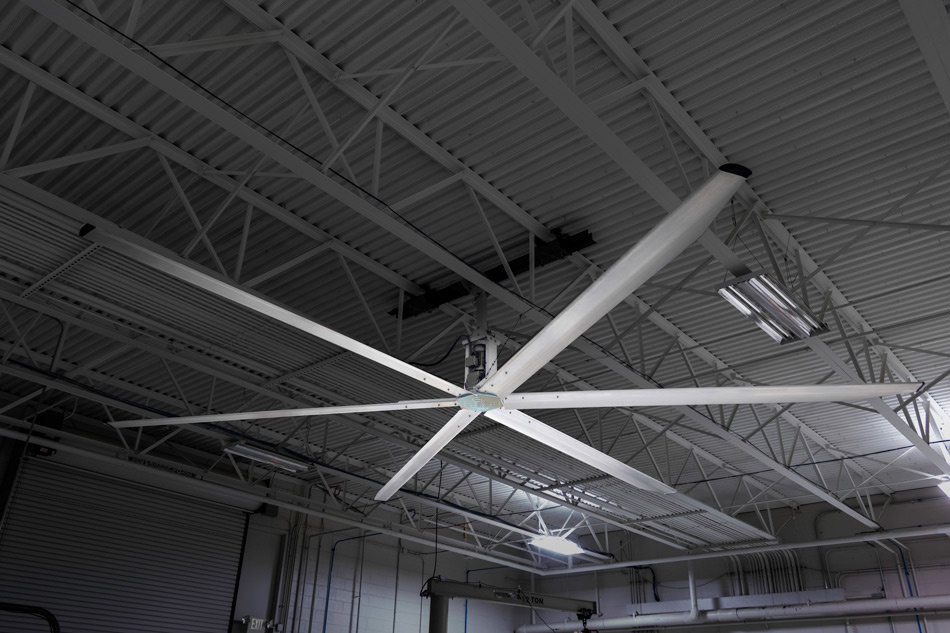High Volume Low Speed
The High Volume Low Speed (HVLS) fan is ideal for heating and cooling in a variety of commercial and industrial applications, providing a constant flow of air throughout a space for sensible cooling and de-stratification of warm air pockets near the ceiling. The HVLS fan efficiently and quietly moves a large volume of air at a low operating cost.
- Available in 3-Blade and 6-Blade configurations
- Range from 8 to 24 foot diameter
- Operates on 1 to 2 horsepower, capable of moving nearly 275,000 CFM
- Used year-round with benefits in both heating and cooling conditions
- Quiet and efficient operation with minimal maintenance required
- Low operating expenses, costs approximately 6 cents/hour for one fan at 0.75 kW
- User friendly controls with wall-mounted LCD screen
- Creates a non-disruptive laminar airflow above floor level to provide effective summer cooling
- Provides destratification at lower speeds, or reverse rotation during heating months
- Reduces the recovery time when overhead doors are open via a constant flow of air throughout the space
- Eliminates the need for noisy “man-cooler” type fans throughout the facility
- Will not interfere or disrupt make-up air, heating or air conditioning systems
- Motor mount assembly constructed of 1/8" thick epoxy-coated steel and grade 8 hardware
- All mounts constructed of 1/4" thick epoxy-coated steel and grade 8 hardware
- Safety clips prevent rotor or blade from falling in an unlikely failure of the hub or drive system
- Variable frequency drive provides soft start and full variable speed operation
- Operated manually, automatically or via building management systems
- Emergency shutdown feature interlocks with the building fire alarm panel
- Real-time status of fan speed, space temperature and status via digital interface with wall-mounted LCD screen
- Microprocessor-based controls provide customizable options
F-HVLS Models are ETL Listed under file number 104224395ATL-001A and conform to ANSI/UL Standard 507 and CAN/CSA C22.2 No. 113.
Drawings
- Concrete Beam Mount (Direct)
- Concrete Beam Mount (Direct) (3 Blades)
- Concrete Beam Mount (Multi)
- Concrete Beam Mount (Multi) (3 Blades)
- I-Beam Mount
- I-Beam Mount (3 Blades)
- Open Web Steel Joist Mount (Direct)
- Open Web Steel Joist Mount (Direct) (3 Blades)
- Open Web Steel Joist Mount (Bottom Multi)
- Open Web Steel Joist Mount (Bottom Multi) (3 Blades)
- Open Web Steel Joist Mount (Top Multi)
- Open Web Steel Joist Mount (Top Multi) (3 Blades)
- Purlin Mount
- Purlin Mount (3 Blades)
- Revit Model
- Wood Laminate Beam
- Wood Laminate Beam (3 Blades)
- Wood Truss Mount
- Wood Truss Mount (3 Blades)
- HMI Details

